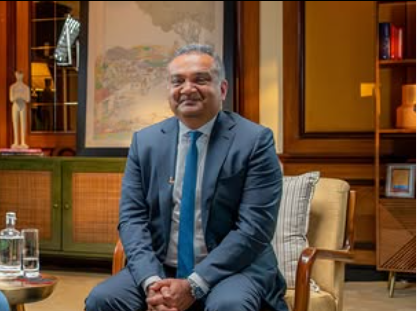Neal Mohan has skillfully maneuvered through the upper echelons of the tech industry over the past 20 years with a style that is remarkably clear, purpose-driven, and methodically executed. In addition to holding prominent executive positions, his estimated net worth of $155 million in 2025 reflects his ability to stay ahead of changing technological trends without chasing attention.

Mohan’s early career was influenced by the corporate consulting structure when he began working at Accenture in 1996. He moved into the tech startup industry by the late 1990s, joining NetGravity, which ultimately placed him at the center of digital advertising. Mohan’s worth as a strategist and product visionary became incredibly clear when DoubleClick purchased NetGravity and then Google purchased it in a $3.1 billion deal.
Neal Mohan – Personal and Professional Snapshot
| Attribute | Information |
|---|---|
| Full Name | Neal Mohan |
| Estimated Net Worth (2025) | $155 million |
| Current Role | CEO of YouTube |
| Nationality | Indian-American |
| Education | Stanford University – B.S. & MBA |
| Previous Employers | Accenture, NetGravity, DoubleClick, Google |
| YouTube Join Year | 2015 as Chief Product Officer |
| CEO Appointment | 2023, succeeding Susan Wojcicki |
| Monthly Salary | ₹3.1 crore (approximately $375,000) |
| Board Memberships | 23andMe, Stitch Fix |
| Reference Site |
He was already employed at Google by 2007 and was collaborating closely with Susan Wojcicki, who would go on to become the CEO of YouTube. He was a key contributor to Alphabet’s financial engine by expanding Google’s display and video ad platforms. Twitter made an attempt to hire him as their Chief Product Officer during this time. Google reportedly responded with a $100 million retention offer because they didn’t want to lose him. Mohan added intrigue to an already fascinating career by tactfully avoiding confirming the exact figure in a recent podcast interview, but he also didn’t deny the story.
As Chief Product Officer, Mohan joined YouTube in 2015 and was responsible for the creation and expansion of YouTube TV, YouTube Music, YouTube Kids, and the increasingly well-liked YouTube Shorts. Each project greatly increased YouTube’s user base and revenue-generating tactics. Not only did these products boost sales, but they also significantly enhanced the company’s reputation as a platform that combines education and entertainment. During this stage, Mohan’s leadership was especially helpful in maintaining YouTube’s adaptability and customer focus.
Not only was Mohan’s elevation to CEO anticipated, but it was warmly welcomed by the Silicon Valley and creator communities when Susan Wojcicki resigned in 2023 to concentrate on personal pursuits. Colleagues and partners alike have commended his cool-headedness and notably data-driven approach. He highlighted important topics like bolstering creator monetization, tailoring the platform for TV screens, and leveraging AI to improve search and discovery tools in his first annual letter as CEO in 2025. These objectives show a forward-looking strategy that is already showing remarkable results.
In addition, Mohan oversees YouTube’s trust and safety division, making sure that content moderation complies with regional laws and public values. This level of accountability, which is frequently contentious, has emerged as a key characteristic of all significant platforms. His leadership in this field exemplifies a very effective fusion of platform flexibility and policy enforcement.
In addition to his position at YouTube, Mohan serves on the boards of companies like 23andMe and Stitch Fix, lending his experience to these businesses. These connections broaden his impact into fields like biotech and fashion tech, which are becoming more and more influenced by digital scalability, user personalization, and data analytics. Mohan assists these businesses in adopting a more dynamic approach to customer engagement by utilizing insights from YouTube’s algorithmic growth and user behavior analysis.
Mohan talked about how social media algorithms impact political discourse and how creators manage visibility during his appearance on the People by WTF podcast. His opinions were very clear and his tone was comfortingly reasonable, which is encouraging for people who think tech executives should look out for the interests of the general public as well as shareholders.
Tech companies have come under heavy fire for their influence on online behavior during the last ten years. The difficulties are numerous and range from misinformation to data privacy issues. Mohan’s leadership style stands out as being especially creative in this regard—not because it creates something from scratch, but rather because it pragmatistically and modestly improves upon preexisting systems.
Despite not receiving as much media attention as Sundar Pichai or Elon Musk, Mohan has had a big influence on digital culture. Instead of making dramatic changes, his tenure has been characterized by steady, well-considered improvements. For example, Mohan put YouTube in a better position to compete with platforms like TikTok, which still draws younger audiences, by making significant investments in short-form video formats and live streaming features.
His career’s financial trajectory serves as both an example of measured ambition and a testament to long-term planning. His alleged monthly salary of ₹3.1 crore is increased by Alphabet’s stock growth and prior incentive plans. This combination has developed into a sizeable net worth over time, reflecting both strategic capital gains and earned income.
Mohan’s presence supports a larger trend in the context of growing Indian-American influence in U.S. tech companies. He demonstrates how international talent, molded by global education and experience, is increasingly leading companies that define digital infrastructure alongside executives like Shantanu Narayen at Adobe and Satya Nadella at Microsoft. In addition to being personal achievements, their accomplishments reflect a shift in the leadership demographics that is progressively reshaping business priorities.
Mohan’s subtle yet potent influence serves as a reminder that subdued skill can have an equally significant impact as audacious disruption. His $155 million net worth is not only remarkable but also well-earned due to his capacity for leadership, flexibility, and growth under duress. His approach of assisting creators, updating infrastructure, and incorporating AI is still going strong as YouTube marks its 20th anniversary. It’s setting the pace, if anything.
